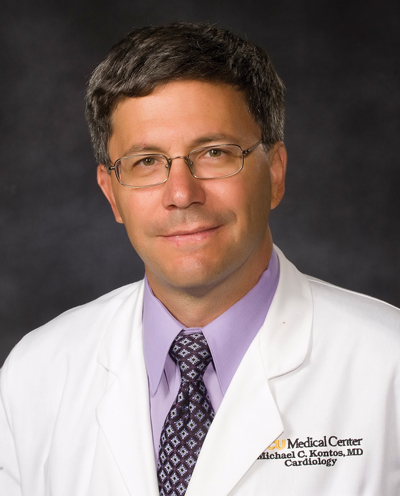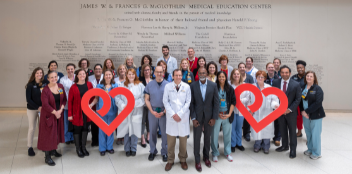Q and A with Dr. Michael Kontos

In June, Dr. Michael Kontos visited Manchester, England, where he met with members of the British Cardiovascular Society, the international exchange partner of the Virginia Chapter of the American College of Cardiology since June 2018.
While in England, Kontos attended joint meetings as well as the launch of a leadership academy, modeled on one sponsored by the American College of Cardiology, which provides the tools for fellows and early career cardiologists to become successful as they move through their careers.
The Beat spoke with Kontos, president of the Virginia chapter, shortly after his return to learn more about what he hopes to accomplish in his three-year term, which began in 2018. Kontos is Pauley’s medical director of the Coronary Intensive Care Unit and holds the Harry F. Stern Cardiovascular Professorship.
What excites you about this new partnership?
It provides an opportunity to see how other practitioners manage cardiology patients in a different healthcare environment, both from an academic and a governmental point of view. Obviously, the British healthcare system is significantly different than the U.S., where they have a very large national healthcare institution provide universal care, where ours is much more of a mixture of federal, state and private insurance.
One of our goals is to first collaborate and exchange ideas. In the upcoming one to two years, we’d like to do an exchange program, either with fellows or early career cardiologists. They would travel from here to the UK or from the UK to Virginia for a couple of weeks and visit one to two different centers.
What else have you focused on as president?
For the past couple of years, in November, our state ACC meeting has been carried out as a collaborative mid-Atlantic meeting with Virginia, D.C., Delaware and Maryland. We’ve had speakers from all states and an emphasis on fellow engagement, including research presentations by the Fellows in Training (FITs), and a Jeopardy contest between the different states. Last year, we had an evening program for the fellows on early career planning that will be expanded this year.
Another focus is on quality. Over the past two years, we’ve created a new registry that includes data collected from cardiology programs throughout the state that compares clinical outcomes and procedures with cost data. There are very few other states that do that. We have a state quarterly meeting which allows sharing of the data as well as sharing best practices to both improve outcomes and decrease cost. Currently, we’re looking at PCI cost and outcome variation.
You had great success in the General Assembly, with the passage of four bills. What was your response?
(He laughs) It’s one of those things I don’t think you can ever predict. I give great credit to the legislators that decided to pass Tobacco 21, which raises the age that one can purchase or possess smoking or vaping products to 21. It’s a little bit surprising given Virginia’s tobacco history.
I think physicians have a fairly powerful voice with legislators. One of the important things that we bring to the table is, when we’re lobbying for something, we’re not lobbying for us; we’re actually lobbying for the patient.
Was there one law that was especially important to you?
Tobacco 21. If you can delay people initiating smoking until after they’re 21, that’s likely to substantially reduce overall long-term rates. I think the vaping part is important because vaping is perceived to be a bit cooler than smoking cigarettes; it’s not as frowned upon. Yet there’s more and more data coming out that shows, while not as dangerous as tobacco smoke, it’s clearly not safe. Vaping likely also helps people accelerate into smoking.
Were there any other highlights for you this year?
Watching the Virginia team—which was made up of all VCU fellows—win at the American College of Cardiology Jeopardy nationals. In the last couple of rounds, it was like watching Jeopardy champion James Holzhauer.
Here are some of the results from the four bills, supported by the VCACC, that passed in this year’s General Assembly:
Reform of step therapy protocol to allow exemptions in certain situations. These protocols often require patients to fail one or more medications before they can begin a treatment plan preferred by their physician.
Ensuring payment for preapproved surgeries and invasive procedures, including additional medical care for needs that may arise during the intervention.
Raising the minimum age for purchasing and possessing tobacco or vaping products to 21.
Banning tobacco and vaping products on public school grounds, including school buses and school-sponsored events.
Back to Autumn-2019
Join our Pauley Consortium composed of patients, friends and advocates.

